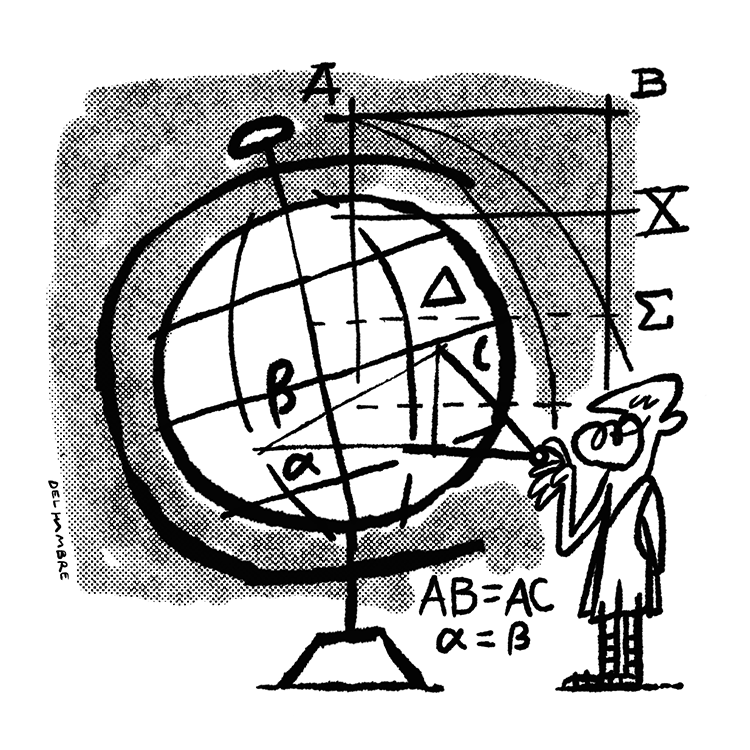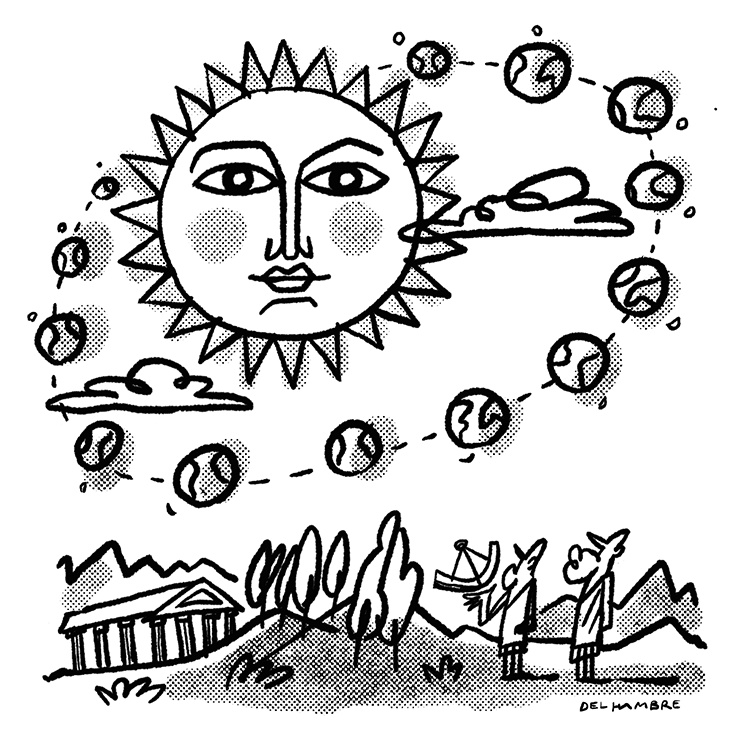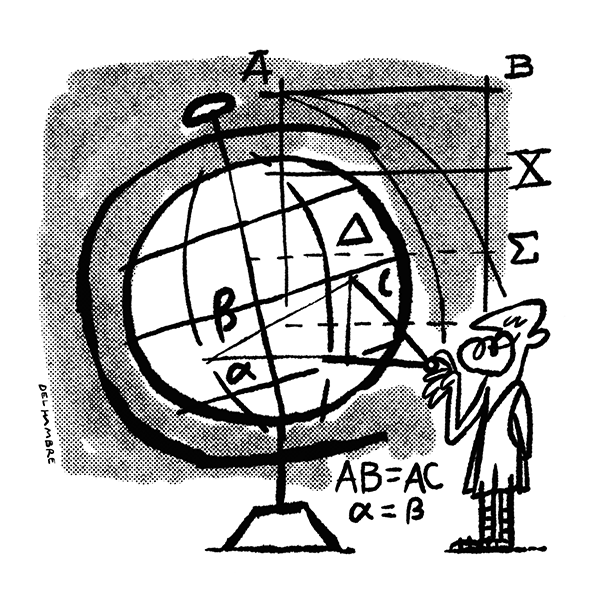Although often not favorite subjects in school, our world is built on math and science. It’s literally everywhere.
Today, we understand so much of the world thanks to math and science, and it’s been our understanding of these fields that have been driving human progress since its inception.
Each and every culture to exist on this Earth cared about math and science in some capacity. But the ancient Greeks stand out as being one of the most significant contributors.
Existing at a time when little was known about the physical world, the Ancient Greeks made some discoveries that changed human history and helped solidify their place in the story of civilization.
Let’s take a look at the many ways in which the Greeks influenced these all-important fields.

Math
The contributions made by the ancient Greeks to the field of mathematics gave birth to modern math. In general, the Greeks were mostly focused on geometry, hoping to explain shapes using numbers.
This focus led to some pretty significant discoveries, all of which are still relevant to the mathematics we do today.
Thales Theorem
The ancient Greeks were thinking about math as far back as the 6th century BC. Their focus: geometry.
One of the biggest names from this period was Thales, who lived in Ionia, the region of ancient Greece that was actually on the southwestern coast of modern-day Turkey.
There, he came up with what is now known as Thales’ Theorem. It states that: if a triangle is drawn inside a circle and the longest side is the diameter of the circle, the opposite angle will always be a right angle.
Also part of Thales’ Theorem are descriptions of the ratios between line segments created when one line is intercepted by parallel lines.
If you’re not a geometrist, these ideas likely don’t mean much. But at the time they were HUGE. They laid the groundwork for much of the work done by later Greek mathematicians, including Euclid, who arguably had the biggest impact on modern math of any of the ancient Greek scholars.
Euclid
When it comes to ancient Greek mathematicians, perhaps the standout MVP is Euclid. Born sometime in the fourth century BC, towards the end of the Classical Era of Ancient Greece, little is known about his life.
However, he left behind a book, Elements, that is arguably one of the most influential texts of all time. Why? Well, because the theorems and mathematical proofs inside have gone on to form the basis for all of modern mathematics.
Much of what Euclid published was known in some form or another by previous Greek mathematicians. But Euclid put them all together, and he also was the first one to use mathematical proofs to show why his ideas were true, a tradition still in use today.
Today, the ideas laid out by Euclid are referred to as Euclidean geometry.
Other types of geometry do exist. But Euclidean ideas are also at the foundation of algebra and number theory, making it one of the true pillars of modern math. Without it, who knows where we’d be today?
Pythagoras
Another A-lister from the roster of ancient Greek mathematicians is Pythagoras. Again, little is known about him and how he lived. But he was a scholar of all sorts, dipping into not only math but also philosophy.
Many of his ideas were considered…different…for the time, and they helped him attract a small but dedicated following. But his musings into math had a profound impact on the field.
His most famous contribution: the Pythagorean Theorem.
One of the fundamental concepts of geometry, this theory states that the length of two sides of a triangle squared equals the length of the third also squared. In math terms, this is a2 + b2 = c2.
To figure this out, the Pythagoreans had to imagine constructing squares based on the lengths of each triangle. From there, they realized that the area of the largest square is equal to the area of the two smaller ones. Knowing this makes it possible to find out the unknown length of a side of a triangle by only having the lengths of the other two.
This was a groundbreaking discovery that reinforced the Pythagorean belief that all of reality could be explained using numbers.

Science
In addition to mathematics, the Greeks were also quite interested in science. Of course, they didn’t have the base knowledge or the tools to study it the way we do now, they still made some pretty remarkable discoveries that have gone on to impact our modern world.
The Archimedes Principle
Ever wonder how boats as big as oil tankers and cruise ships can float? Doesn’t it seem weird that these massive structures sit atop the water while a rock you toss in sinks right to the bottom?
At first glance, yes, it does seem weird. But not when you consider the scientific principle created by Archimedes, the Greek scholar living in Syracuse (located in modern-day Sicily) during the 3rd century BC.
His theory, which states that an object will float when it is pushed upwards by a force that is greater than the weight of the water it displaces, perfectly explains why these large boats float.
This might seem like a simple idea today, but it was revolutionary at the time, and it added significantly to our understanding of the physical world.
Hippocrates
Medicine isn’t something the ancient world was known for. A lack of knowledge and effective treatments made some ancient medicine gruesome if not downright barbaric.
But that doesn’t mean they didn’t try, and in the process, they made a key discovery that changed the world.
Specifically, a man named Hippocrates of Cos, who was a doctor, determined that illnesses were in fact not the result of the gods’ wrath. Instead, they came on as a result of a number of physical circumstances.
In other words, Hippocrates was the first one to say that illness was not random but rather scientific and could be treated effectively. He was also one of the first people to prescribe diet, hygiene, and sleep as treatments for illness, something we still do today.
Hippocrates is also known for The Hippocratic Oath. Technically a medical text, the key thing about the Oath is that it asks physicians to swear to a higher power that they will protect any sick or injured person that comes their way. The idea was to place doctors under a higher ethical standard than other professions.
This tradition still continues to this day and is an important component of becoming a modern doctor. .
Aristotle’s Method
Aristotle was one of the most influential Greek scholars of all time. He worked in various areas, but he was most definitely a scientist.
One of the things Aristotle believed was that the physical world could be understood by studying it: documenting it, looking for patterns, and using these to draw conclusions.
This approach differed greatly from what was being done at the time. Most of Aristotle’s contemporaries believed explanations of the world had to come from somewhere beyond the physical world.
As a result, Aristotle’s ideas were met with considerable resistance when they were first introduced. But this idea of using observation and logic to explain physical phenomena is basically the founding principle of the modern scientific method. No big deal.
Biology
One of the ways Aristotle pursued his method was by documenting nature. He spent years of his life tracking down and drawing different plants and animals, searching for patterns and similarities.
This laid the groundwork for much of modern biological classifications. Much of what Aristotle did has been updated for modern times, but his discovery of the relationships between what appeared to be completely different species changed our understanding of biology.

Astronomy
The ancient Greeks were also stargazers. Again, they were quite limited by the technology available to them, as well as the prevailing knowledge of the time. But despite this, they were able to make a few key discoveries.
First, they were the first people to get really good at measuring and predicting the movement of planets and stars. In fact, the ancient Greeks were the first people to accurately predict a solar eclipse. A major accomplishment way back then.
The ancient Greeks were also famous for coming up with the idea that the Earth orbited around the sun, not the other way around as it so often appears.
Interestingly, this idea was ignored for thousands of years, mainly because of the influence of the Catholic church. So, when it was “rediscovered” by Renaissance scientists, it seemed like a big deal. But, really, the Greeks had thought of it ages ago.
Inventions
Lastly, the ancient Greeks weren’t just interested in studying science for the sake of it. They were also interested in inventing new things that would make their lives easier and better.
Some famous inventions to come from ancient Greece include the alarm clock, invented by Plato using water to make a sound at a given time. They also invented the watermill, which is used to ground wheat into flour, central heating, and the crane.
Archimedes, famous for his principle, also invented a type of lever that allows water to move up a hill. This is now known as the Archimedes screw.
All in all, while they were interested in explaining shapes, numbers, and the stars, the Greeks were also interested in making cool stuff.
An Ancient Civilization Ahead of their Times
All of this learning and academic pursuit was not the norm in the ancient world at the time. All ancient civilizations set out to study the world, but only in ancient Greece was this an integral part of society.
Because of this tradition, the ancient Greeks were able to make discoveries and come up with inventions that not only put them ahead of their neighbors but that also had a profound impact on the overall development of human civilization.
Written by Matthew Jones
Illustrated by Del Hambre
